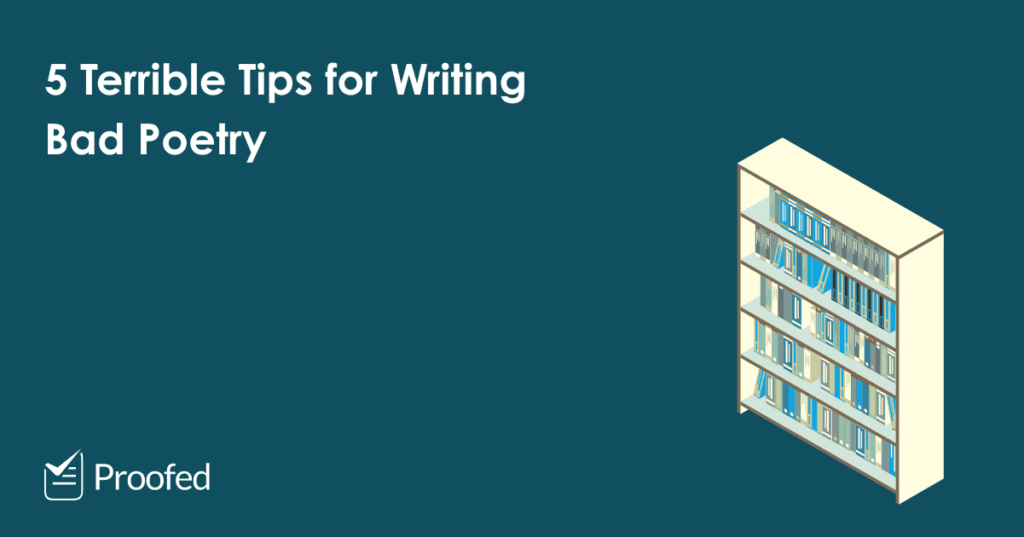Today is Bad Poetry Day. In other words, it’s a time to write awful verse without any shame! And we have five tips for writing truly terrible poems:
- Use simple rhymes without thinking about whether they’re appropriate.
- Mix up the order of words so it sounds “arty.”
- Use weak modifiers that leave little impression on your readers.
- Be hugely literal (metaphor and simile are for losers).
- Sprinkle in clichés people have heard a thousand times before.
For more on how to write bad poetry, read on below!
1. Use Simple Rhymes
For some people, poetry equals rhyming. And if it doesn’t rhyme in every line, it isn’t a poem. This isn’t true by any standard – many poems avoid rhyming completely. But if you want your poem to sound a bit rubbish, using simple rhymes throughout is a good first step.
To do this, you’ll need to pick a rhyme scheme. Stick to simple, repetitive patterns, like rhyming couplets. This is when each pair of lines rhymes:
I want to write
Deep into the night
But poetry is hard
And I’m not a bard
If you’re feeling more ambitious, you could try rhyming alternating lines:
Rhyming is easy
When you know how
But this poem is cheesy
So it’s time to say ciao
You can even experiment with awkward half rhymes if you like!
2. Mix Up Your Words
Anastrophe involves changing the standard word order of a sentence for emphasis. For example, rather than saying “The night was cold,” we could use anastrophe and say “Cold was the night” to give it a more dramatic edge.
Admittedly, this sounds a bit odd and old-fashioned, but those qualities can really add to a bad poem, especially if you use it to force an awkward rhyme:
Use well this figure of speech
Lest readers faint away with a screech
Here, for instance, we’d usually say “Use this figure of speech well.” But “well” doesn’t rhyme with “screech.” And rather than find another word that fits, we’ve decided to mix up the sentence to force the rhyme. After all, why try harder when you can just torture English grammar to fit your needs?
Find this useful?
Subscribe to our newsletter and get writing tips from our editors straight to your inbox.
3. Add Plenty of Weak Modifiers
A good poem will paint an image in the reader’s mind with powerful, evocative language. As such, to write a bad poem, you should sprinkle plenty of weak adjectives and adverbs throughout.
By “weak,” we mean words that don’t say much about the thing described, like “nice” or “good.” But other common modifiers are good, too, especially if you use them in place of a more dynamic verb or noun.
For example, if we wanted to say that someone was running, we could use verbs like “dashes,” “sprints,” or “races.” However, these words immediately conjure up a feeling of speed, so they risk making your reader feel something. To avoid this, then, we would just say “runs very fast.”
4. Be Very Literal
Metaphors and similes are essential to poetry, letting us see familiar things anew. To write a bad poem, though, try to make it as literal as possible. State things plainly, avoiding any figurative imagery. For example:
The sun is very hot
It makes me sweat a lot
I wish it wasn’t sunny
‘Cause heat makes me feel funny
Sure, there may be more lyrical ways of evoking summer heat. But in bad poetry, you don’t want to leave any room for interpretation!
5. Throw in a Tired Cliché or Two
Never underestimate the power of a cliché. We’ve touched upon several poetic clichés already, such as the idea that poetry has to rhyme. In this case, though, we’re thinking of phrases so overused they have lost all power:
A sea of grass sways in the breeze
I sit here, fresh as a daisy
Days like this are the bee’s knees
All fun and games, feeling so lazy
Stock phrases like these will really show off your lack of imagination.
How to Write Good Poetry
Not so keen on writing bad poetry? Then maybe you should do the exact opposite of what we recommend above. In practice, this means you should:
- Use rhyme carefully and remember that poetry doesn’t have to rhyme.
- If you are going to use anastrophe, make sure it doesn’t leave you with awkward sentence structures that ruin the flow of your poem.
- Focus on evocative language, especially dynamic verbs.
- Use metaphors and similes to engage your reader’s imagination.
- Avoid clichéd and overused phrases wherever possible.
And if you’d like to be sure you avoid any of the “bad poetry” pitfalls mentioned in this post, our poetry proofreading services are always available. Just let us know how we can help!
